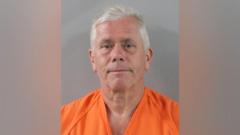Construction is underway on "Alligator Alcatraz" in the Everglades, intended to detain migrants as part of a highly controversial initiative backed by Florida's Republican leadership. Concerns from human rights advocates and environmentalists are mounting regarding the implications of this facility in a fragile ecosystem.
Florida's 'Alligator Alcatraz': Controversial Migrant Detention Center in the Everglades

Florida's 'Alligator Alcatraz': Controversial Migrant Detention Center in the Everglades
A near-abandoned airport in Florida's Everglades is being transformed into a contentious new detention facility for migrants, sparking environmental and human rights concerns.
A convoy of trucks laden with construction supplies and temporary facilities has converged on a nearly deserted airport in the stunning expanse of Florida's Everglades. This site, designated a UNESCO World Heritage Site, is not on track to receive a tourist attraction but is instead being adapted into a new detention facility for migrants, provocatively named "Alligator Alcatraz."
The location, a pilot training airstrip 43 miles from Miami, has sparked debate as it sits within a delicate and vital ecosystem. Florida's Attorney General, James Uthmeier, publicly downplays security concerns, claiming the natural landscape surrounding the facility includes little more than alligators and pythons for detainees to contend with.
The facility’s inception stemmed from an executive order by Republican Governor Ron DeSantis in 2023, aiming to bolster the Trump administration’s stringent immigration policies. Designed to accommodate approximately 1,000 individuals, "Alligator Alcatraz" is expected to begin operations in mid-summer, drawing criticism as a stark emblem of ongoing immigration restrictions.
At a recent press briefing, DeSantis hinted at the possibility of additional similar facilities, indicating a rapid expansion of these detention capabilities. As the U.S. embarks on what the Trump administration claims will be “the largest mass deportation program in history,” conditions in current centers are reportedly under scrutiny, with record overcrowding reported by Immigration and Customs Enforcement (ICE).
Local opposition is forging a strong front, notably led by Betty Osceola, a member of the Miccosukee Native American community who fears lasting environmental impacts. Advocates believe the facility will not serve a temporary purpose but may be in operation for years, exacerbating conditions for detainees. The American Civil Liberties Union (ACLU) of Florida has condemned the plans, arguing that they reflect a punitive rather than a systematic approach to immigration.
Accompanying the contentious debates are statements from federal officials, including Homeland Security Secretary Kristi Noem, declaring Florida’s forthcoming detention center as a product of an efficiently administered immigration policy backed by federal funds, specifically through FEMA.
Despite the speed of this transformation, Miami-Dade County's Democratic mayor, Daniella Levine Cava, is demanding further clarity on the environment and funding implications associated with this facility. Reports from the area highlight that many undocumented individuals continue to live in fear of detainment, affecting daily life in South Florida.
As "Alligator Alcatraz" begins to take shape amidst the swamps, it remains to be seen how this initiative will impact both the local ecology and the lives of those it intends to confine.




















